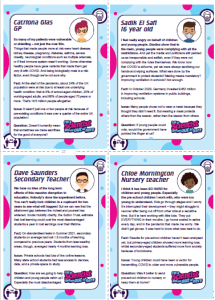
One of the Good Things about Teaching (and, indeed, Learning) Sociology is that it offers up plentiful opportunities for classroom discussion in ways that can be a hugely-beneficial teaching and learning experience.
A main downside to building discussions into your lesson plan is, of course, that without a strong structure designed to get students to think about different viewpoints and draw appropriate conclusions, discussion can rapidly dissolve into a distracted mess of competing opinions on and around everything but the question at hand.
There are, as you might expect, a shed-load of practices and strategies available to anyone interested in ways of developing structured discussions, both in the offline and online classroom, but if you’re of the opinion there’s always room for different ways of doing things you might want to consider the Science Debate Kits aimed at KS3 and 4 students (14 – 16 year olds in the UK).
Although the blurb around the kits refers to them as a STEM resource, the basic underpinning principle – students take-on a range of structured roles for the purposes of discussion – is one that’s easily-adapted to something like GCSE Sociology or Psychology.
So while many of the prepared Kits (debates around Food Hygiene, Space Travel and IVF) are broadly aimed at KS3 and 4 Science a number have a more-general audience that could be used as is in GCSE Sociology. This includes debates around areas like Unisex Toilets, Drug legalisation / Decriminalisation and Big Data. In this respect each pre-constructed Kit provides:

While these ready-made Kits are undoubtedly useful as both a time-saver and pointer as to how the debate can be structured, many KS4 Sociology teachers are likely to find the Blank Debate Template Kits more-useful. This will be particularly the case if you want to explore issues that aren’t covered in the existing Kits or if you want to adapt existing Kits to a more-sociological orientation for your students.
Either way the Kits (and the associated website) could prove to be a valuable resource that’s well-worth exploring if you’re looking for ways to introduce debates with a clear narrative flow into your classroom.
In addition, although the Kits are designed for 14 – 16 year olds there’s probably nothing to stop you adapting the broad principles involved to higher-level discussions post-16. You could, for example, try combining the Trial-by-Jury discussion format with the Science Kit role-playing format to create a very-interesting (or not, as the fancy takes you) discussion hybrid.
And you don’t get more sociological than that.
Share This Post
Related
Discover more from ShortCutstv
Subscribe to get the latest posts sent to your email.

